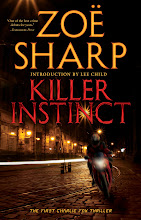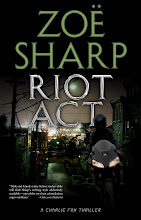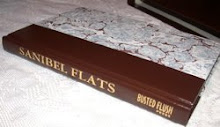 Edgar Award-nominated crime writer Gabriel Cohen (pictured at left; Red Hook) took a few minutes to chat with fellow novelist and friend, two-time Edgar Award nominee Reed Farrel Coleman, whose Shamus / Anthony / Barry Award-winning third Moe Prager novel, The James Deans (trade paperback, $14), will be reprinted next week from Busted Flush Press.
Edgar Award-nominated crime writer Gabriel Cohen (pictured at left; Red Hook) took a few minutes to chat with fellow novelist and friend, two-time Edgar Award nominee Reed Farrel Coleman, whose Shamus / Anthony / Barry Award-winning third Moe Prager novel, The James Deans (trade paperback, $14), will be reprinted next week from Busted Flush Press.GC: When you wrote Walking the Perfect Square did you know that it would be the first book in a series?
RFC: The honest answer, though it’s one that may leave readers dissatisfied, is that I wrote the book as a stand-alone, but made sure to build it in such a way as to leave room to turn it into a series. For instance, I needn’t have given Moe such a rich and deep backstory if it were only a stand-alone. My hope was that an editor would recognize the potential to blossom the book into a series. For instance, one prominent editor for whom I have great respect, just couldn’t see how I could make a series out of it given that I had laid out the arc of the series in the first book. Luckily, others have recognized the potential and let me follow up. It was a hell of a challenge to pull it off, but that’s one of the things I enjoy most about writing.
GC: Your protagonist is connected to the NYPD by virtue of being a former member, but he’s not currently a cop. What kind of freedom does that positioning give him that he wouldn’t have as a normal cop?
RFC: As you know, when you’re writing a cop on the job, you have somewhat strictly confined parameters. When he strays beyond those parameters, he’s essentially breaking the law. This is one of the abiding conflicts in a series like yours. But there were certain moral dilemmas I wanted Moe to explore that would have been impossible had he still been on the job. Moe is free to act outside the rules, but not necessarily the law. It also allows him to tackle personal cases, which, had they come to him as a currently serving police officer, he would have had to recuse himself from. As a former cop, though, he does have access that a normal citizen or even a PI might not have. He also understands the system cops operate under and hence has an idea of how to manipulate it to serve his purposes.
GC: The reason Moe left the force is so mundane: he slipped on a carbon copy. How did you make that choice, rather than have him go out in some heroic or tragic fashion?
 RFC: In general, Moe is about turning the whole haunted-white guy-loner-alcoholic-Christian-fist happy-gun crazed-ex-cop conceit on its ear. The fact is I love those books and those detectives. I love Marlowe and Spade and Scudder, especially Scudder. But I couldn’t simply rewrite what the masters had already done and done better than I ever would. So I took the conceit and turned it on its ear by making Moe a lot of the things those classic detectives weren’t. And I figured the best way to start that de-evolution was to have Moe injured in an incredibly inglorious and mundane way. Plus, I am friendly with an ex-NYPD sergeant who hurt his knee in exactly this way.
RFC: In general, Moe is about turning the whole haunted-white guy-loner-alcoholic-Christian-fist happy-gun crazed-ex-cop conceit on its ear. The fact is I love those books and those detectives. I love Marlowe and Spade and Scudder, especially Scudder. But I couldn’t simply rewrite what the masters had already done and done better than I ever would. So I took the conceit and turned it on its ear by making Moe a lot of the things those classic detectives weren’t. And I figured the best way to start that de-evolution was to have Moe injured in an incredibly inglorious and mundane way. Plus, I am friendly with an ex-NYPD sergeant who hurt his knee in exactly this way.GC: Your books are very deeply rooted in their setting of Brooklyn. Do you think there’s a sort of native Brooklyn attitude or view of life? How do you communicate that to a reader who lives in, say, Peoria, or Texas—or some foreign country, for that matter?
RFC: The Moe books are published in several different countries and I get fan mail from all over the States, so I guess I must be doing something right. But I think the answer lies in the essence of who Moe is and how personally and intimately I present him to the reader. First off, I think most people are proud and connected to where they come from or where they were raised. Hence there’s a sense universality and as long as you present that connection, whether it’s to Brooklyn, Hong Kong, El Paso or Paris, in a way that isn’t condescending, readers will connect. I think readers get it because they get Moe’s connection.
GC: I notice that you like to give Moe’s story verisimilitude by tying him in with real historical events, as when you mention that he can just be spotted in the background of some news footage of the arrest of the Son of Sam. Could you talk about how your interest in New York history ties in with your fiction?
RFC: You’ll notice that the first four Moe books take place in the 70s and 80s. That is no accident. I was 13 in 1970, so I did my real growing up during this period of years. The city’s history during those years is my history and my history reflects in Moe’s history. For instance, in Walking the Perfect Square, Moe says he was at Shea Stadium during the 77 Blackout. Well, he wasn’t really, but I was. And if you lived through that summer, you can’t ever forget how the Son of Sam held this city in his grip. Not before, not since, not even in the wake of 9/11, have I witnessed anything like it. I think by me having this connection, it helps Moe connect with the readers.
GC: The books of the series show a long arc of Moe’s life and character. Do you think he reached places that would have surprised you when you were writing the first book?
RFC: The short answer to that is absolutely yes. I’m a pretty organic writer and I never outline, so I am constantly surprised by my characters and their development. It’s another aspect of writing that makes all the struggle worth it.
GC: Can you give an example or two of ways in which Moe or other characters have surprised you?
 RFC: Absolutely, but I confess to never being surprised by Moe. More often than not, it’s by a character who begins life as a foil for Moe or someone to move the plot along. First off, Mr. Roth, who first appeared in Redemption Street, and who has been in all subsequent books, began as a minor character. He was put in to give certain information to Moe about the book’s antagonist Sam Gutterman and to somewhat balance Sam’s perpetual sarcasm. Yet, no matter how I tried to minimize Mr. Roth’s role, he kept asserting his presence. Eventually, Roth grew into the moral center of the series and came to represent many things. He was the father Moe would have chosen and he is Moe in old age. This also happened with the character Wit, Yancy Whittle-Fenn, a celebrity reporter who appears in The James Deans and Soul Patch. Wit turned from simple foil to the character who did the most to redeem himself and turn his life around. The best thing about these two characters is that they are, after Moe, the most beloved characters in the series.
RFC: Absolutely, but I confess to never being surprised by Moe. More often than not, it’s by a character who begins life as a foil for Moe or someone to move the plot along. First off, Mr. Roth, who first appeared in Redemption Street, and who has been in all subsequent books, began as a minor character. He was put in to give certain information to Moe about the book’s antagonist Sam Gutterman and to somewhat balance Sam’s perpetual sarcasm. Yet, no matter how I tried to minimize Mr. Roth’s role, he kept asserting his presence. Eventually, Roth grew into the moral center of the series and came to represent many things. He was the father Moe would have chosen and he is Moe in old age. This also happened with the character Wit, Yancy Whittle-Fenn, a celebrity reporter who appears in The James Deans and Soul Patch. Wit turned from simple foil to the character who did the most to redeem himself and turn his life around. The best thing about these two characters is that they are, after Moe, the most beloved characters in the series.GC: What do you see as the long arc of your series? Since your sense of character is very strong, I’m assuming that your main interest is some kind of internal development for Moe Prager. Do you feel that it’s all about a positive evolution of the character, that he grows older and wiser? Is that necessary?
RFC: Oy! I always struggle with questions likes these because I let my series arc develop from book to book and don’t really plan this stuff out. I guess I began Walking the Perfect Squarewith two basic premises in mind: Keeping secrets from those closest to you will lead to ruin. The past is never really past. But I didn’t see this overarching development when I began. And frankly, I don’t think all of Moe’s evolution is positive, but I do believe that character evolution is necessary. I have always disliked the trope of the static detective. In other words, I find it silly that one case ends and two days later a beautiful femme fatale is magically waiting in the detective’s office with another case. That’s why Scudder was particularly appealing to me. Unlike Marlowe, he grows and evolves.
GC: In this age of electronic media, it seems that the dramatic TV series offers opportunities that are in some ways very similar to what a series of novels can do. They can explore the long-term development of a protagonist and other characters, they can paint a wide picture of a world, they can follow plots and subplots with a lot of depth. With shows like The Wire or The Sopranos around, what do you think that novelists can offer that a TV show (or movies) can’t?
RFC: I love The Wire, Deadwood, The Shield, though I soured on The Sopranos. And yes, like you say, they allow for a novelistic depth of character that old format TV doesn’t. What novels can offer that TV can’t is beautiful, nuanced writing. That is not to say that the writing for TV is not nuanced. It is, but it isn’t beautiful, it’s not poetic. And I don’t want people to misunderstand, by beautiful I don’t mean flowery or overblown, but TV is still a visual medium. Even in the series I mentioned, much of the story is told wordlessly. As much as I love dialogue, and I do love dialogue, novels are about much more than dialogue. TV is about images and dialogue.
GC: As we both know, it’s already hard trying to build a viable career as a writer. Especially given this new economy and its impact on the publishing business, how do you hold onto the sense of mission that drives such a career?
RFC: It’s a calling. It’s the only thing I ever felt compelled to do. And I think I was very fortunate to have been published by a very small publisher when I began my career. It didn’t stop me from dreaming or trying for a bigger career, but it certainly tamped down my expectations and let me learn. So from early on I got an education that helped me see that my career had to be about the writing itself and not the dreamt of rewards. I often tell my writing students and frustrated beginners to fall in love with writing and not with what they’ve written. I learned early on to let the physical act of writing be its own reward. This philosophy may never get me riches and fame, but it has gotten me the respect of my peers, many loyal fans, and has helped me become a better writer.
GC: It seems, to this writer anyway, that one of the challenges of this career is maintaining a sense of balance and momentum despite what is happening to others. We see mediocre writers who are handsomely rewarded by both the publishing business and by the reading public; we see very talented writers who somehow never catch on. How do we maintain our own internal compass?
RFC: I go back to the previous answer and I’ll expand on it. Because I began small, very small, I worked in isolation for many years. My writing world consisted of reading and writing. I wasn’t part of some greater writing community and my only concerns were about my work and improving my writing. I never concerned myself with how my buddies were doing because I didn’t have writing buddies. I didn’t go to MWA dinners because I didn’t know the MWA or other organizations existed. So I was never looking over my shoulder at writers coming up behind me or ahead of me to strive somehow for things those writers had. Also, I went to therapy for many years to deal with issues of jealousy and resentment. I worked very hard to learn that my happiness isn’t dependent on measuring myself against others. It’s one of the greatest lessons there is. Besides, writers have so little control to begin with, it’s madness to think you can control popular taste or luck. You need to learn early on that there’s no magic correlation between quality and success. And when I have those occasional bouts of feeling sorry for myself, I remember that there are hundred, if not thousands of people who would give their right arms for my career.
GC: You’ve been interviewed a fair amount. Are there any questions you’ve wished you’d been asked, but haven’t been? If so, what are they?
RFC: No one has ever asked me to explain the plot of The Big Sleep. I’m glad you didn’t ask.
Gabriel Cohen’s novel Red Hook was nominated for the Edgar Award for Best First Novel. His second novel featuring Brooklyn South Homicide detective Jack Leightner, The Graving Dock, was published in 2007, and a third book in the series, Neptune Avenue will be released by St. Martin’s Minotaur this May. He is also the author of Boombox, a novel, and Storms Can’t Hurt the Sky, a nonfiction book about dealing with divorce. He has written for The New York Times, Poets & Writers, the New York Post magazine, Crimespree, and other publications, and will be the guest lecturer aboard the Queen Mary 2 ocean liner on a transatlantic cruise in May. He is currently at work on a fourth Jack Leightner novel.
Reed Farrel Coleman's The James Deans (trade paperback; $14) -- the Shamus / Anthony / Barry Award-winning third Moe Prager novel -- will be reprinted next week, with new bonus features!: New foreword by best-seller Michael Connelly; new afterword by Reed Coleman; two Moe Prager short stories ("Requiem for Jack" and "Requiem for Moe"); and excerpt from fall 2009 novel, Tower (written with Ken Bruen). Find copies at your favorite independent, chain, or online bookseller. See the list at the right for some indies that support and stock BFP!
Coming next: An excerpt from The James Deans and Reed's top-ten list of books that have influenced most...































.jpg)


No comments:
Post a Comment